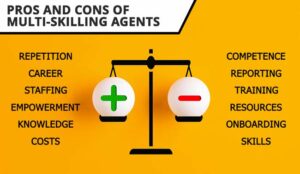Agent motivation is a big focus in the contact centre and drives everything from leader boards to “Pizza Fridays”. However, centre leaders also need to proactively address any issues that are demotivating their agents too.
Our consultants’ panel shares how they think contact centre leaders are unintentionally demotivating their frontline staff and what they can do about it.
Are You Unintentionally Demotivating Your Best Agents?
Here are 35 ways you could be demotivating your frontline teams without even realizing it:
1. Cancelling Training and Coaching
This shows agents their development is not a priority. While declaring “All Hands on Deck” during a temporary service level emergency makes sense, repeated training and coaching cancellations show agents their career growth does not matter.
That is demoralizing!
It also deprives them of the additional skills and knowledge to handle calls faster and better, which would improve service levels.
Contributed by: Mike Aoki, President of Reflective Keynotes Inc.
For more on this, take a look at our article on 12 Reasons You Shouldn’t Skip Training in a Short-Staffed Call Centre
2. Overlooking the Need for Personal Growth Opportunities
One element that leads to demotivation is the absence of personal growth opportunities. Often, frontline agent roles are viewed as transient stepping stones to ‘better’ positions.
When companies fail to provide adequate learning and advancement opportunities, employees might perceive their jobs as dead-end roles, breeding discontent and lack of motivation.
Contributed by: Rob Clarke, Director and Co-Founder at Elev-8 Performance
3. Lack of Support and Resources
One way contact centres inadvertently demotivate their frontline agents is through a lack of support and resources.
When agents are promised training, tools, or systems that will enhance their performance, but those promises remain unfulfilled, it sends a clear message that their needs are not a priority.
This can lead to frustration and a sense of helplessness, ultimately resulting in demotivation.
Contributed by: Justin Robbins, Founder & Principal Analyst at Metric Sherpa
4. Sending Agents to Sleep in Their Induction
Making sure the induction training is setting the right tone is an important factor too. I’ve seen inductions that send agents to sleep.
You need to engage your agents from the very beginning. And when I say engage, I’m not talking about ‘forced fun’ activities, I’m talking about mentally engaging them.
Engagement is the key to a motivated workforce, as when agents aren’t motivated, why should they care about your customers?
Engaged agents want to provide the best experience possible for your customers. By treating your agents with respect and giving them autonomy, they’ll walk through fire for your company and your customers. They’ll become your greatest asset and advocates.
Here are some things to avoid in your inductions if you want people to be motivated:
- Don’t hammer them with eLearning! Yes, you have compliance eLearning to complete but does it really need to be done in the induction?
- Make your content role-specific. There is a tendency to tell new starters everything about everything. Stop. Think about why they need to know it and how they can use it.
- Ask your agents what works and what doesn’t work. Just ask the question, you may be surprised by their response!
Contributed by: Kim Ellis, Chief Learning Architect at Go Ginger Learning Solutions
5. Springing Brilliant New Ideas on People

As leaders, we want what’s best for our team, we want to be the ones that make that
difference and build a legacy for success.
So, with good intentions, we go in search of the silver-bullet idea, that magic formula that will make our agents successful and happy and ultimately leave us a proud legacy. After all, how can it not work if we only want what’s best for everyone?
Sadly, this is often where we unintentionally demotivate agents… We don’t include them in the process and creation of our plans and we don’t ask for feedback on our potential ideas enough.
When ideas, processes or changes are sprung upon people, they will naturally dig their heels in at first because of the uncertainty of it all. They will feel demotivated because they are left out and don’t feel part of the whole thing.
However, when we include them in the process and creation from the beginning, there is more buy-in and accountability for the idea or process.
Contributed by: Clayton Drotsky, Director of Growth Crew Ltd
6. Letting Them Find Out About Changes Through “Water Cooler Talk”

Communication is key! Ideas, process enhancements, and retention strategies are all great, but they must be communicated to the agents in a timely manner.
Your frontline should not find out about a process change, promotion, or new reward by chance or through “water cooler talk”.
This lack of communication shows a lack of care, and the frontline agents can easily feel that they are not valued or respected.
Contributed by: Sangeeta Bhatnagar, SB Global Human Capital Solutions
7. No Understanding of Wider Company Goals
Without regular feedback, recognition, or understanding of wider company goals, agents can feel detached and unappreciated.
A lack of support and communication from leaders can also lead to a sense of isolation and stress.
Contributed by: Rob Clarke, Director and Co-Founder at Elev-8 Performance
8. You Listen to Their Feedback… But Don’t Close the Loop

Listening to your agents’ feedback is one thing, but it’s nothing if you don’t close the loop. In fact, if they don’t know anything was done with their feedback, your agents may actually feel even worse than if you didn’t ask them at all.
Even if you’re unable to take the desired action, you can at least let them know that their feedback was taken into consideration.
Closing the loop lets your agents know that you value their time, that you value their opinions, that you value them.
Contributed by: Matt Lyles, Keynote Speaker, Brand Consultant and Podcast Host at Matt Lyles & Co LLC
9. Letting the Day Job Get in the Way of Regular Communication
Nobody sets out to demotivate, but sometimes the “day job” gets in the way and this is where we have an opportunity to ensure we do better.
To paraphrase Kirstie Allsopp, Phil Spencer, or Tony Blair – “Communication, communication, communication.”
There is no quicker way to demotivate our teams than to stop communicating. It is essential that the whole business understands how its activity directly affects the wider business objectives and performance.
We must ensure that the communication loop is complete. If a “motivational” activity begins, don’t let it wither on the vine. If a league table is created, communicate it. If prizes are on offer, don’t wait to be asked to announce who won!
Contributed by: Dave D’Arcy, a globally award-recognized CX leader and Founder of Laughing Leadership
10. Forgetting to Share the Value of the Work They Do

Silence is NOT golden. One of the easiest ways to leave agents feeling a little lacklustre is in failing to share the impact they have on the customers they support.
Most contact centres collect customer feedback and sentiment, and this should be shared with your agents in real time.
Doing this not only supports agents to know where they can work on their personal development, but positive feedback can boost motivation.
If customer feedback isn’t socialized frequently, you leave your agents at risk of not seeing the value in the work they do, day in, day out.
Of course, sharing negative feedback comes with a risk of demotivating, but here’s where talented team leaders need to effectively position the insight and focus on skill building vs. reprimand.
Contributed by: Katie Stabler, Founder and Director of Customer Experience at CULTIVATE Customer Experience by Design
11. Failing to Lead by Example
There’s no better way to demotivate your agents than to fail to display the behaviours outlined in your quality assurance process when interacting with them or with escalated customers.
Sadly, I’ve been guilty of being less-than-helpful and certainly less-than-friendly when my workday is interrupted by a question from an agent or a customer. It’s imperative that we lead by example — always!
Contributed by: Jeremy Watkin, Director of Customer Experience and Support at NumberBarn
A Case Study: Reducing Intrinsic Motivation

James Lawther
In the early 1970s, a group of psychologists from Stanford University in the US ran some experiments with nursery school children.
The children, between three and a half and five years old, were given different toys and tasks throughout the day, from building blocks and cooking utensils to outdoor games and equipment, to keep them entertained.
Some activities were always there whilst nursery teachers swapped others around, ensuring that the children always had something new to do.
The scientists wanted to understand the impact of incentives on children’s motivation, so they provided them with paper and fancy magic markers one day.
The scientists then sat behind a one-way mirror and recorded how much time the children spent drawing and colouring rather than playing with the other toys and activities.
Once they had created a baseline level of engagement, nursery teachers invited the children to draw pictures. They split the children into three randomly allocated groups.
The first group were asked to draw a picture; the scientists told the second group that if they participated, they would get a “good player award”; this was a card with a big gold star, a bright red ribbon and their name written upon it. The final group weren’t offered the gold star but received it after they had completed the drawing.
A couple of weeks after the experiment, the team returned with their stopwatches and one-way mirror, laid out the magic markers again, and recorded how much time the children spent playing with the drawing equipment a second time.
They discovered that the children the scientists had promised a big gold star had lost interest in drawing. In contrast, those who didn’t receive one, or received it after the event, continued to play with the drawing equipment with the same enthusiasm.
The experimenters had demonstrated the “Overjustification Effect”. It occurs when an external incentive, such as a bonus or a big gold star, reduces somebody’s intrinsic motivation to perform a task.
The message for parents is that whilst it may be sensible to bribe your child to clean their bedroom (I have two teenage daughters, and neither of them has any intrinsic motivation to tidy up), it is unwise to offer them the same reward to read a book or study for their exams. This is because motivation plummets once the bribe (or bonus, or gold star) is taken off the table.
The organizational implication is similar. Once you start offering rewards and incentives to your staff to do things they are already motivated to do, like fixing operational issues or resolving customers’ complaints, the incentive becomes the table stake. If you stop paying the “discretionary bonus”, performance will plummet.
In addition to measuring children’s engagement, as a side experiment, the psychologists asked a group of judges to rate the quality of the pictures the children completed.
They were scored from 1 (very poor) to 5 (very good). The average quality score for the children who knew they were working for a gold star was 2.18 versus an average of 2.77 for the two groups that weren’t expecting a reward. The children became more focused on the carrot dangled before them than their pictures.
If you think you are “motivating” your staff with targets and cash bonuses, you certainly are. You motivate them to get the cash bonus, but that isn’t the same as motivating them to do a good job.
Those bonuses are the crack cocaine of motivation. Watch what happens when you try to stop.
Undermining Children’s Intrinsic Interest with Extrinsic Reward: A Test of the Overjustification Effect [Article] / auth. Lepper Mark R, Greene David and Nisbett Richard E // Journal of Personality and Social Psychology. – [s.l.] : American Psychological Association, 1973. – Vol. 28. – pp. 129-137.
Contributed by: James Lawther, Director of Squawk Point Consulting
12. Criticizing Long AHT (Even When It’s for the Right Reasons)

I worked in one contact centre where agents actively avoided doing account transfers, even though they were good for both customers and their business.
Why? The process had too many manual steps during after-call work (ACW) that increased their average handle time (AHT) and potentially made them look bad.
So, they avoided it because the reward for doing good work was potentially inviting criticism from their manager.
Contributed by: Mike Aoki, President of Reflective Keynotes Inc.
13. Rigid Script Adherence
One way to demotivate agents is with rigid script adherence or QA, which can drain their enthusiasm. While guidelines are necessary for consistency, a lack of flexibility inhibits agents from engaging in genuine, empathetic interactions with customers.
It makes the job monotonous, stifles creativity and could lead to a feeling of being unvalued and replaceable.
Instead, there should be a blend of ‘accountable freedom’. This allows agents autonomy in their tasks and decision-making processes, yet expects them to take ownership of the results, whether successful or otherwise.
This fosters an environment of trust and respect, where creativity and innovation can thrive, but also ensures that there’s a sense of responsibility and diligence.
14. Overemphasis on Metrics

Overemphasis on metrics is another demotivating factor. Quantifiable targets are essential for tracking performance, but focusing solely on numbers— call duration, or number of calls answered—ignores the qualitative aspect of customer interactions.
It inadvertently sends the message that efficiency is prized over quality service. This is amplified without a clear link between those metrics and customer success stories. It becomes measurement for measurement’s sake.
Contributed by: Rob Clarke, Director and Co-Founder at Elev-8 Performance
15. Publicly Sharing Performance
Publicly posting the entire performance of a team for a particular metric is a quick-fire way to demotivate agents. Perhaps it is tickets responded to or successful upselling attempts or any number of other statistics.
Yes, the few high achievers on the team are likely motivated to keep achieving, but I suspect that anyone else further down the list is either embarrassed or says “why bother trying… I’m too far behind at this point.”
If you can, share such metrics on an individual basis and set reasonable goals for each team member instead.
16. Asking Capable Team Members to Escalate Issues They Could Easily Handle Themselves

Demotivation can also occur when you fail to empower highly motivated and capable team members to resolve customer issues on their own.
Whether it’s a judgement call or the ability to push an admin-only button, it’s so demotivating when agents have to escalate an issue, knowing that they could easily take care of it with a little training.
You must always have an inventory of such issues and constantly work to train your agents up on them.
Contributed by: Jeremy Watkin, Director of Customer Experience and Support at NumberBarn
17. You Empower Them… But You Don’t Define What It Means
You empowered your agents to solve customer problems on their own, but things actually got worse? Try defining their level of empowerment…
Empowerment doesn’t mean agents should feel like they’re on their own.
Without clear guidance on resolving customer issues, they may panic – especially if they feel their decision may be judged later. So, give them definitions and guardrails on their level of empowerment.
Defining their empowerment gives your agents psychological safety, so they feel confident they won’t get in trouble for taking initiative. When your agents are confident, they’re motivated!
Contributed by: Matt Lyles, Keynote Speaker, Brand Consultant and Podcast Host at Matt Lyles & Co LLC
If you want to know what an empowered employee looks like in the contact centre, read our article: What Does Employee Empowerment REALLY Mean?
18. Promising One Thing and Doing Another
“People will judge you by your actions, not your intentions. You may have a heart of gold, but so does a hard-boiled egg.”
This quote by Maya Angelou is an essential reminder for leaders wrestling with demotivated agents. Your actions carry far more weight than your words or intentions, and every time you say or promise one thing and do another, you erode employee confidence and credibility.
Unintentional demotivation of frontline agents can occur when there is a misalignment between management’s words and actions.
This misalignment breeds an atmosphere of scepticism, where employees question the authenticity of their leaders’ intentions. The impact on employee morale and motivation can be significant if their actions consistently contradict their words.
19. Unclear Expectations and Inconsistent Feedback

For frontline agents, unclear expectations and inconsistent feedback can be demoralizing. When performance metrics and goals are ambiguous or constantly changing, agents struggle to understand what’s expected.
In such an environment, agents may feel like they are chasing moving targets, leading to frustration and a loss of motivation. If supervisor feedback is inconsistent or contradictory, agents may become confused and unsure how to improve.
Contributed by: Justin Robbins, Founder & Principal Analyst at Metric Sherpa
20. Running Orientation as a One-Off Tick-Box Exercise
One demotivator is the new hire orientation process. In many call centre organizations, orientation is finite, usually 2 to 5 days, top-down, one-way, “I know everything, you know nothing” customer service instruction.
But that’s not good enough! Orientation should be continuous, frequent, and interactive between coaches, veteran call centre agents, and novices.
21. Always Saying ‘Customer-Centric’ and Forgetting About Your Frontline

Touting that your organization is customer-centric and that it’s about customers first is a real demotivator. Instead of focusing on “customers first”, envision “people first” as the solid foundation for everlasting business success.
One caveat is “employees first”. Managers will always see people as “employees”. Despite preaching “employees first”, senior leaders would always have the “rank and file employees” first, on the bottom of the ladder, well below the leaders. And their employees will know it.
Recognizing “people first”, leaders will CARE for their people:
- COMMUNICATE openly, transparently, interactively, and frequently.
- APPRECIATE the important roles, responsibilities, and efforts of their people.
- RECOGNIZE and offer accolades for individual and team achievements.
- EMPOWER people to make the right decisions.
With the “people first” culture, no longer are people taking second or third seats to customers or profits. This cultural transformation of “people first” will enthuse and energize people to be engaged with their colleagues, customers, and your business.
Contributed by: Bill Quiseng, Chief Experience Officer at billquiseng.com
22. Talking About Being “World Class” When You’re Anything But
Oftentimes organizations will speak about a commitment to “world-class” or “best practice” service. Yet the centre design and management are anything but “world class” owing to understaffing, long wait times, restrictive and challenging IVR menus, and so on.
The company may discuss how the “customer is the most important asset” and then enact policies and procedures that appear designed to restrict or limit the customer’s ability to use, consume or return a product or service.
This two-faced approach by the organization is not only disingenuous, but it may also cause the agent or employee to question the accuracy or veracity of other statements or promises made by the company to them.
This environment demotivates agents and can also lead to increased attrition, lower engagement, and increased staff turnover. To keep agents engaged and not questioning management you need to “walk the talk”.
23. Creating Confusion With Silos

Another disconnection can occur where different departments ‘own’ pieces of the contact centre process.
For example, the new agent onboarding training is handled by HR or Learning and Development (L&D) and the graduating students are then handed over to the floor management for deployment.
This process appears logical on paper, but isn’t always so in practice – particularly if graduating agents are told to “forget what they learned in training”, by their production supervisor, as it’s “no longer correct”.
Viewing the onboarding process in discrete and separate pieces can lead to misalignment and disconnection that undermines the organization’s credibility with their staff and demotivates. You need to view all activities holistically – not as individual pieces.
Contributed by: Colin Taylor, CEO of The Taylor Reach Group, Inc
24. Not Trusting Agents to Carry Out Tasks
Merriam-Webster defines perspective as “The ability to perceive things in their actual interrelations or comparative importance.”
Consider with me, a business hires “professional call centre agents” then constantly piles on hindrances to these professionals, such as inadequately planned training, processes that slow customer response, refusing to trust the agents to carry out tasks inside written and established guidelines, insisting on one-size-fits-most incentive programmes, and so much more.
The agent becomes dejected, and woe betide that business then. Demotivation shows up in myriad ways. What they want is perspective from those placed in charge.
25. Sitting for Days, Weeks, Months, or More on a Decision

Nothing can deflate motivation faster than sitting for days, weeks, months, or more on a decision. An employee observes an issue, musters the courage to bring that decision to you, and then the observation dies of apathy and neglect in your email inbox.
Then, as a leader, you return to your employees and ask for ideas on improving, rubbing salt and alcohol into a gaping wound.
Who cares if the idea is not in the “desired” format, show the employee how to improve as you take action on the ideas presented, or conversely, continue to beg for the voice of the associate and kill that voice through inaction.
Contributed by: Dr M. Dave Salisbury, COO at D&C Consulting LLC
26. Focusing on the Wrong Things

For many years, there has been a focus on average handling time (AHT). While this is important, it can be a hammer used to demotivate your agents.
In recent years the shift has been to look at the customer experience as a whole, with AHT only playing a part of it. But only focusing on your customer experience can also be a trap because who delivers your customer experience? Your agents.
When delivering induction training across multiple contact centres, I’ve always said to new agents, I don’t care how quick you are, I would rather you do your best for the customer. I build in a recurring theme of creating advocates and treating every customer as you would your family.
Contributed by: Kim Ellis, Chief Learning Architect at Go Ginger Learning Solutions
27. Making Processes More Difficult
When processes are difficult and hard to follow, it demotivates people. Keep this in mind when adding in new tools and technology to help your customers and make sure you stop to think about the employee experience too.
You have to keep asking yourself “did we make it easier for our people, or did we make it more cumbersome?” The harder you make it for people to do their job, the less motivated they are and the less engaged they will be with your customers.
28. Needing to Work With Multiple Programs Open
Expecting agents to work with multiple programs open at the same time can be very frustrating and demotivating.
For the best employee experience, agents need all the information and knowledge in one place.
29. Being Too Serious
Always being formal and serious can demotivate the team in the long run.
Even just spending 3 minutes laughing together over a silly cat video online can make the world of difference to creating camaraderie in the workplace, so make sure you make time to have fun!
Contributed by: Shep Hyken, Chief Amazement Officer (CAO) at Shepard Presentations LLC
To discover some of the top ways to make work fun, read our article: Ways to Make Working in a Contact Centre Fun
30. Only Offering One Type of Incentive
“Oh no! Not movie tickets again this month!” While some people love movies, other people do not. So, vary rewards and incentives.
Movie tickets, gift cards, pizza lunches, meal deliveries (for home-based agents) or getting to leave one hour early once a month can be effective prizes.
However, they need to be rotated before people become bored with them. Better yet, look to promotional companies that offer a points programme, where agents earn points for positive behaviours and can redeem them for a variety of rewards.
Contributed by: Mike Aoki, President of Reflective Keynotes Inc.
31. Falling Back on Old Techniques and Tired Processes

It’s so easy to assume that we know what motivates our contact centre teams. But often we are using old techniques and tired processes.
We have all seen bean bags, fruit on Friday, and free coffee, the short-term need to build excitement with a fancy dress day. But WAIT! This doesn’t do it for everyone…
Not everyone is excited by fancy dress or parties! The demographic make-up of contact centres today is different from 20 years ago.
We have many different age ranges, cultures, interests, etc… No aspect of our operations is a “one-size-fits-all” and this goes for motivation too!
Contributed by: Dave D’Arcy, a globally award-recognized CX leader and Founder of Laughing Leadership
32. Absence of Recognition and Appreciation
Another demotivating factor is an absence of recognition and appreciation. Frontline agents are often the face of the company, dealing with challenging customer interactions and resolving complex issues.
They may feel undervalued and unimportant if their efforts go unnoticed or unappreciated. A lack of recognition erodes morale and dampens enthusiasm, leaving agents demotivated and disengaged.
Contributed by: Justin Robbins, Founder & Principal Analyst at Metric Sherpa
33. Missing Opportunities to Bring People Together as a Team

Did you know? If you have a monthly pizza party, the real outcome is not the pizza – it’s the bringing people together, so they feel like they’re part of the team. That’s what’s motivating!
So the big question is… “Are you creating enough opportunities to bring people together?”
Not making time for these things can contribute to a feeling of demotivation amongst your teams. Particularly where you’ve got people working from home who are typically more isolated.
34. Just Paying Them Money
Are you doing anything to help make sure your people are working for more than just a pay cheque?
If all you’re doing is giving them a job and paying them money, there is nothing motivating about that in the long run.
And guess what? The first company that offers them a bit more money is going to take them away from you. It’s as simple as that.
Contributed by: Shep Hyken, Chief Amazement Officer (CAO) at Shepard Presentations LLC
35. Zero Consideration for Food Allergies or Dietary Choices
You would think ordering lunch in for the team would be very motivating! Think again! The food choices ordered can be inclusive or very alienating for some team members.
I saw one centre order food choices with zero consideration to food allergies, sensitivities, or dietary food choices.
The intention to “break bread” together is nice, but not being sensitive to the various dietary restrictions and choices could make those not considered feel unwelcome, as they are left watching while others are enjoying and eating.
Contributed by: Sangeeta Bhatnagar, SB Global Human Capital Solutions
If you are looking for ways you can keep staff engaged and motivated, read these articles next:
- 12 Ideas to Keep Agents Engaged During Meetings and Training Sessions
- 50 Staff Engagement Ideas to Motivate Your Team
- 100 Great Staff Incentives to Motivate Your Team
- The Best Motivational Games for Employees and Remote Workers
Author: Megan Jones
Reviewed by: Rachael Trickey
Published On: 19th Jul 2023 - Last modified: 23rd Sep 2025
Read more about - Call Centre Management, Bill Quiseng, Clayton Drotsky, Colin Taylor, Communication Skills, Dave D’Arcy, Dave Salisbury, Editor's Picks, Employee Engagement, James Lawther, Jeremy Watkin, Justin Robbins, Katie Stabler, Kim Ellis, Management Strategies, Matt Lyles, Mike Aoki, Motivation, Rob Clarke, Sangeeta Bhatnagar, Shep Hyken, Training and Coaching






































